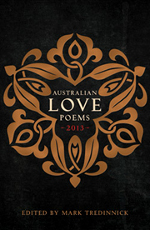
Australian Love Poems 2013, Mark Tredinnick, ed.
Inkerman & Blunt, 2013
‘… Day
is so deep already with involvement’
Michael Dransfield, ‘Pas de Deux for Lovers’ (1968)
In his 1951 essay ‘Against Poets’, Polish writer Witold Gombrowicz describes the poet ‘as a being who can no longer express himself as much as someone who must express – a Poem’. With such sentiment in mind I approached Australian Love Poems 2013 with some apprehension. Despite all the lofty rhetoric surrounding love poetry – and, understandably, there is plenty of it in the eloquent, generous introduction to this anthology by editor Mark Tredinnick – would it ultimately prove, as Gombrowicz might suggest, to be a ‘boring orgy’?
That Australian Love Poems 2013 seeks to package and commodify poetry (and indeed love) is something that we can take as a given. It is the first pressing of new publisher Inkerman & Blunt, and will soon be followed by a companion volume Australian Love Stories 2014 to be edited by Cate Kennedy. The Press’s choice of editors for both anthologies offers no surprises, with Cate Kennedy and Mark Tredinnick both prize-winning writers with an ear for the so-called common reader. Anthologies also come with the built-in caveat that while they may strive to be inclusive, they will always exclude. Again, I take this as part of their (much maligned) territory. Yet, as the current crop of Australian poetry anthologies, including The Best Australian series, tend to come from smaller, less commercial presses such as Black Inc. and Puncher & Wattmann, being anthologised these days is hardly canonising. In the early 21st century, as printed anthologies carry less weight, and work more like the mix-tapes of yore, I’d be interested to see publishers also experiment with other models, such as print-on-demand versions where the reader can take on the role of editor and make a customised selection of poems from an on-line catalogue.
So, what of Tredinnick’s selection? Gombrowicz insists that:
Language has become ritualistic—those ‘roses,’ ‘dusks,’ ‘longings,’ or ‘pains that at one time had a certain freshness have become as a result of overuse, an empty sound—this pertains as much to the more modern ‘semaphores’ or other ‘spirals’.
Do these criticisms come home to roost in Australian Love Poems 2013? The anthology does range representatively across the various styles of contemporary Australian poetry, coming together like voices in a community choir for a mass love-in. My poetry allergies predictably flared up over the marathon 200 poems and I got especially ‘snuffley’ when I sensed a ‘muse’ being elevated. The trope of a beloved, often a ‘you’, that allows for subjective slippage and sutures the reader into the poem, started to prevent, rather than encourage, my readerly (mis)identification. Ultimately, however, I stuck tiny yellow plastic post-it notes on the pages where either a poem, or a few lines in a poem, had piqued my interest. I’m pleased to say that once I’d finished reading, my copy of the anthology was resplendent with a dense sulphur crest.
That said, not many of the poems really jumped out at me as worthy of individual glory. I gravitated to a poem by Michael Farrell called ‘The Menage’ that captures a sense of erotic unease: ‘The idea of being seduced’s in the room’. In Jill Jones’s ‘Being Taken’, the title speaks colloquially to the state of being in a relationship, but the poem to the spaces between, using the metaphor of photography. I also liked Alicia Sometimes’s body-without-organs style poem for the heart: ‘None of These & Nothing Else’, in which ‘Sunday morning rolls over &/ slaps Sunday afternoon in the face/ the heart has a strange way of wearing its sleeves’, and Van Roberts’s real-gone ‘Surfer Girl’: ‘i know it’s been building up inside of you for/ oh/ i don’t know how long/ something’s bound to go wrong’. Still, in my opinion, no one in this anthology has quite written ‘break-up’ poems like David Musgrave’s ‘Coastline’, winner of the Newcastle Poetry Prize, 2012, or Anthony Lawrence’s ‘Open Letter With Commentary’ published under the pseudonym Kelly Fargo and runner-up in the Newcastle Poetry Prize, 2011, which name checks Lou Reed’s Berlin. A noticeable omission from the contributors list, Lawrence is a poet, not unlike Tredinnick, who, at the top of his form, can throw the poetry of lesser ‘bards’ into stark relief.













